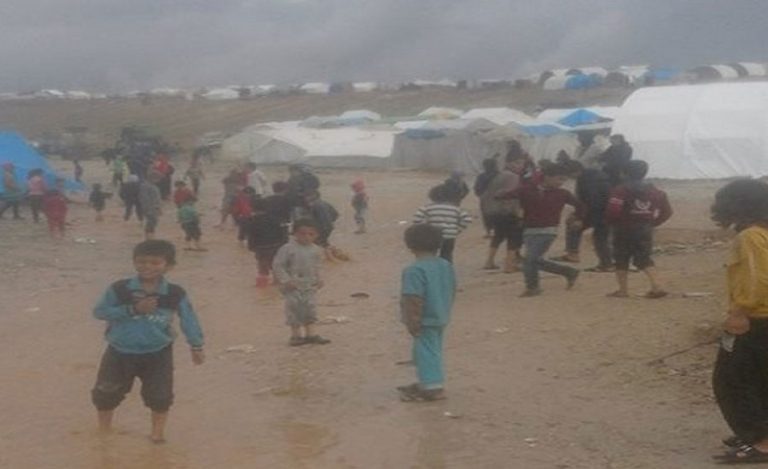Forced from their homes, they found themselves under tent ceilings and amid the mud and floods of winter and the burning sun of summer, lacking all the necessities of life in the camps of the city of Jarablus in the eastern Aleppo countryside.
In the city of Jarablus, the Zoghra camp hosts a group of displaced people from the Al-Waer neighborhood of Homs, while the Al-Jabal district — which is split into two parts — includes displaced people from Al-Waer on one side, and on the other side lives people from all provinces, especially areas of the Aleppo countryside, Deir-ez-Zor and Raqqa.
The displaced and refugees in these camps suffer from a tragic humanitarian situation, often lacking all the necessities of life.
Water
Beginning with the basic necessities for any human, the displaced people in the Zoghra and Al-Jabal, which include more than 8,000 people, lack water first of all, whether potable drinking water or for their daily needs.
The displaced people are not able to obtain the necessary quantities of water as the camp’s well fails to meet the needs of its residents, even with a limited number of tractors carrying water from outside the camp. Additionally, the water is also calcareous and needs treatment before use. Symptoms of dehydration have appeared with a large number of children in the camp.
The water crisis is not limited to drinking water in the camp, but extends to daily use, for example in terms of bathroom use, which requires residents to spend long periods waiting in lines. Bathrooms for showering are something almost forgotten now, which residents claim is the biggest problem they face due to the difficulty of performing the obligations of prayer in addition to personal hygiene.
Tents and materials
The displaced in the camps of Zoghra and Al-Jabal suffer from a severe lack of mattresses and blankets, with a limited number available which is fewer than the number of families arriving to the camp. Four mattresses and four blankets are distributed as the allotted share for tents, even if it contains more than one family or if the number of people is higher.
The latest batch of displaced from Al-Waer, which numbers more than 1,721 people in 457 families, have not obtained tents. NGOs have resorted setting up large hangars, dividing each one into eight separated compartments, something the displaced people have rejected.
As a result of this, some displaced people have tried to resort to renting homes outside the camps, but the rent in the houses in nearby Al-Bab have reached 30,000-40,000 Syrian pounds, while in the city of Jarablus they are up to $150 or more.
Food and aid crisis
Only the first batch of displaced from the Al-Waer district were able to find stability in the Ain al-Bayda camp, while the second batch of displaced arrived in late March to the Zoghra camp. More batches continued to arrive after that.
After the arrival of the first and second batches, some of the rebel groups provided daily food handouts, but after the arrival of the third batch the distributions stopped entirely. The third batch has not received any food allocations so far.
“Every day an aid committee with a different name and form comes to the camps and takes photographs and records family data, but it’s just ink on paper, nothing more, and we have not seen any result for about 10 months,” according to a resident.
Some residents accused the aid in the Zoghra and Al-Jabal camps of favoritism and handing out aid baskets according to their whims, which has forced the Turkish IHH Humanitarian Relief Foundation to supervise the distribution of aid baskets to the displaced.
One of the residents of eastern Aleppo told Zeitoun that more than 40,000 people displaced from the villages that were under Islamic State (ISIS) control were completed deprived of aid bundles, under the accusation of belonging to the group or supporting it, despite the face that the entire area including the city of Jarablus had been under the group’s control.
Roads, electricity and health
“There is no electricity or any technical services. We have asked many times for pavement or asphalt for the main roads in the camps, and the areas around the public facilities at least, but to no avail,” one of the residents told Zeitoun.
The color of the red soil permeates all features of the camps during the day because of the total lack of paved roads, and when rain falls, water submerges most of Al-Jabal and Zoghra, while darkness prevails over all parts of the camps at night due to the lack of electricity. Regarding health services, they are totally absent from the camps.
This article was translated and edited by The Syrian Observer. Responsibility for the information and views set out in this article lies entirely with the author.


